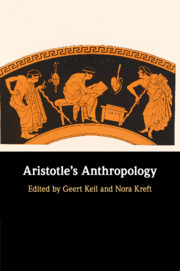Book contents
- Aristotle’s Anthropology
- Aristotle’s Anthropology
- Copyright page
- Contents
- Contributors
- Acknowledgements
- Introduction
- Part I Human Beings as Rational Animals
- Part II Human Nature in the Light of Aristotle’s Biology
- Part III Aristotle’s Moral Anthropology
- Chapter 8 Why Human Virtue Is the Measure of All Virtue
- Chapter 9 Aristotle on Friendship and Being Human
- Chapter 10 Aristotle on the Possibility of Moral Perfection
- Part IV Aristotle’s Political Anthropology
- Bibliography
- Index
Chapter 10 - Aristotle on the Possibility of Moral Perfection
from Part III - Aristotle’s Moral Anthropology
Published online by Cambridge University Press: 27 May 2019
- Aristotle’s Anthropology
- Aristotle’s Anthropology
- Copyright page
- Contents
- Contributors
- Acknowledgements
- Introduction
- Part I Human Beings as Rational Animals
- Part II Human Nature in the Light of Aristotle’s Biology
- Part III Aristotle’s Moral Anthropology
- Chapter 8 Why Human Virtue Is the Measure of All Virtue
- Chapter 9 Aristotle on Friendship and Being Human
- Chapter 10 Aristotle on the Possibility of Moral Perfection
- Part IV Aristotle’s Political Anthropology
- Bibliography
- Index
Summary
An important question regarding Aristotle’s moral anthropology is whether or not human beings can become perfectly good. Should we consider Aristotle’s paradigmatically virtuous agent (who appears under the different names of spoudaios, phronimos, agathos, epainetos, epieikēs, or kalos kagathos) as an ideal figure, i.e. as someone who permanently and infallibly executes morally correct actions? Is his character irreversibly transformed into a state of perfection? Might we describe his inner condition as that of perfect psychic harmony? Or is it true, as some interpreters claimed, notably Shane Drefcinski and Howard Curzer,1 that the virtuous man (Aristotle never mentions female candidates) can act badly? Does he perform, at least to some extent or from time to time, slightly suboptimal actions, or perhaps even more: evil deeds? If Aristotle’s moral anthropology allowed for some imperfection or even considered imperfection as an unavoidable part of the human condition, it would be close to the view of the philosophos held by Plato. If, on the other hand, Aristotle defended an ideal of absolute perfection, he would be somewhere contiguous to the Stoic concept of the sage (sophos).
- Type
- Chapter
- Information
- Aristotle's Anthropology , pp. 200 - 218Publisher: Cambridge University PressPrint publication year: 2019



